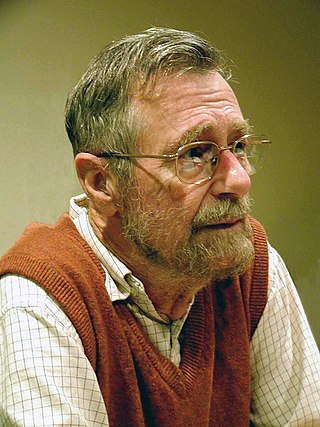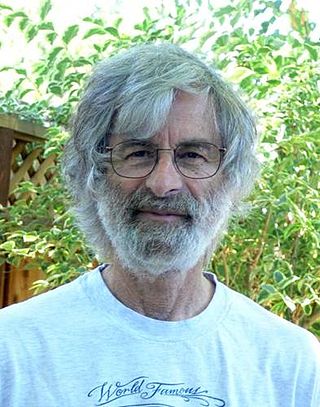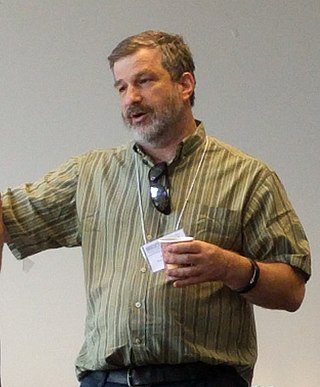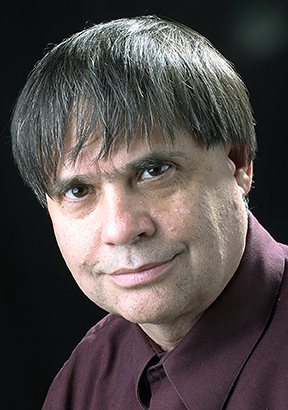Related Research Articles

Edsger Wybe Dijkstra was a Dutch computer scientist, programmer, software engineer, mathematician, and science essayist.

Leslie B. Lamport is an American computer scientist and mathematician. Lamport is best known for his seminal work in distributed systems, and as the initial developer of the document preparation system LaTeX and the author of its first manual.
Self-stabilization is a concept of fault-tolerance in distributed systems. Given any initial state, a self-stabilizing distributed system will end up in a correct state in a finite number of execution steps.
A Byzantine fault is a condition of a computer system, particularly distributed computing systems, where components may fail and there is imperfect information on whether a component has failed. The term takes its name from an allegory, the "Byzantine generals problem", developed to describe a situation in which, to avoid catastrophic failure of the system, the system's actors must agree on a concerted strategy, but some of these actors are unreliable.

Paris Christos Kanellakis was a Greek American computer scientist.

Shlomi Dolev is a Rita Altura Trust Chair Professor in Computer Science at Ben-Gurion University of the Negev (BGU) and the head of the BGU Negev Hi-Tech Faculty Startup Accelerator.
A fundamental problem in distributed computing and multi-agent systems is to achieve overall system reliability in the presence of a number of faulty processes. This often requires coordinating processes to reach consensus, or agree on some data value that is needed during computation. Example applications of consensus include agreeing on what transactions to commit to a database in which order, state machine replication, and atomic broadcasts. Real-world applications often requiring consensus include cloud computing, clock synchronization, PageRank, opinion formation, smart power grids, state estimation, control of UAVs, load balancing, blockchain, and others.

Michael George Luby is a mathematician and computer scientist, CEO of BitRipple, senior research scientist at the International Computer Science Institute (ICSI), former VP Technology at Qualcomm, co-founder and former chief technology officer of Digital Fountain. In coding theory he is known for leading the invention of the Tornado codes and the LT codes. In cryptography he is known for his contributions showing that any one-way function can be used as the basis for private cryptography, and for his analysis, in collaboration with Charles Rackoff, of the Feistel cipher construction. His distributed algorithm to find a maximal independent set in a computer network has also been influential.

Moni Naor is an Israeli computer scientist, currently a professor at the Weizmann Institute of Science. Naor received his Ph.D. in 1989 at the University of California, Berkeley. His advisor was Manuel Blum.
David Peleg is an Israeli computer scientist. He is a professor at the Weizmann Institute of Science, holding the Norman D. Cohen Professorial Chair of Computer Sciences, and the present dean of the Faculty of Mathematics and Computer Science in Weizmann Institute. His main research interests are algorithms, computer networks, and distributed computing. Many of his papers deal with a combination of all three.
Larry Joseph Stockmeyer was an American computer scientist. He was one of the pioneers in the field of computational complexity theory, and he also worked in the field of distributed computing. He died of pancreatic cancer.
The Annual ACM Symposium on Theory of Computing (STOC) is an academic conference in the field of theoretical computer science. STOC has been organized annually since 1969, typically in May or June; the conference is sponsored by the Association for Computing Machinery special interest group SIGACT. Acceptance rate of STOC, averaged from 1970 to 2012, is 31%, with the rate of 29% in 2012.

Cynthia Dwork is an American computer scientist best known for her contributions to cryptography, distributed computing, and algorithmic fairness. She is one of the inventors of differential privacy and proof-of-work.
The Brooks–Iyengar algorithm or FuseCPA Algorithm or Brooks–Iyengar hybrid algorithm is a distributed algorithm that improves both the precision and accuracy of the interval measurements taken by a distributed sensor network, even in the presence of faulty sensors. The sensor network does this by exchanging the measured value and accuracy value at every node with every other node, and computes the accuracy range and a measured value for the whole network from all of the values collected. Even if some of the data from some of the sensors is faulty, the sensor network will not malfunction. The algorithm is fault-tolerant and distributed. It could also be used as a sensor fusion method. The precision and accuracy bound of this algorithm have been proved in 2016.

Toniann Pitassi is a Canadian-American mathematician and computer scientist specializing in computational complexity theory. She is currently Jeffrey L. and Brenda Bleustein Professor of Engineering at Columbia University and was Bell Research Chair at the University of Toronto.
Baruch Awerbuch is an Israeli-American computer scientist and a professor of computer science at Johns Hopkins University. He is known for his research on distributed computing.

Hagit Attiya is an Israeli computer scientist who holds the Harry W. Labov and Charlotte Ullman Labov Academic Chair of Computer Science at the Technion – Israel Institute of Technology in Haifa, Israel. Her research is in the area of distributed computing.

Tal Rabin is a computer scientist and Professor of Computer and Information Science at the University of Pennsylvania. She was previously the head of research at the Algorand Foundation and the head of the cryptography research group at IBM's Thomas J. Watson Research Center.
Dahlia Malkhi is an Israeli-American computer scientist who works on distributed systems and cryptocurrency.

Robert Eliot Shostak is an American computer scientist and Silicon Valley entrepreneur. He is most noted academically for his seminal work in the branch of distributed computing known as Byzantine Fault Tolerance. He is also known for co-authoring the Paradox Database, and most recently, the founding of Vocera Communications, a company that makes wearable, Star Trek-like communication badges.
References
- ↑ Faculty web page, Hebrew University, retrieved 2012-02-18.
- ↑ Scientific Council members, European Research Council, retrieved 2012-02-18.
- 1 2 Siegel-Itzkovich, Judy (February 10, 2011), "First Israeli appointed to European Scientific Council: Hebrew U. professor Danny Dolev, a leading computer scientist and engineer, has been named one of seven new members", The Jerusalem Post .
- ↑ Education from Dolev's web site at the Hebrew University, retrieved 2012-02-18.
- ↑ Danny Dolev at the Mathematics Genealogy Project.
- ↑ Employment history from Dolev's web site at the Hebrew University, retrieved 2012-02-18.
- ↑ Dolev, D.; Yao, A. (1983), "On the security of public key protocols", IEEE Transactions on Information Theory , 29 (2): 198–208, doi:10.1109/TIT.1983.1056650, S2CID 13643880 .
- ↑ Dolev, Danny; Dwork, Cynthia; Naor, Moni (2000), "Nonmalleable cryptography", SIAM Journal on Computing , 30 (2): 391–437, doi:10.1137/S0097539795291562, MR 1769364 . Revised and reprinted in SIAM Review45 (4): 727–784, 2003.
- ↑ Dolev, Danny; Dwork, Cynthia; Stockmeyer, Larry (1987), "On the minimal synchronism needed for distributed consensus", Journal of the ACM , 34 (1): 77–97, doi: 10.1145/7531.7533 , MR 0882662, S2CID 2320860 .
- ↑ Cristian, Flaviu; Aghili, Houtan; Strong, Ray; Dolev, Danny (1995), "Atomic broadcast: from simple message diffusion to Byzantine agreement", Information and Computation , 118 (1): 158–179, doi: 10.1006/inco.1995.1060 , MR 1329246 .
- ↑ Amir, Y.; Dolev, D.; Kramer, S.; Malki, D. (1992), "Transis: a communication subsystem for high availability", Proc. 22nd IEEE International Symposium on Fault-Tolerant Computing, pp. 76–84, doi:10.1109/FTCS.1992.243613, ISBN 978-0-8186-2875-7, S2CID 34618282 .
- ↑ Dolev, Danny; Malki, Dalia (1996), "The Transis approach to high availability cluster communication", Communications of the ACM , 39 (4): 64–70, doi:10.1145/227210.227227, S2CID 5333666 .
- ↑ Dolev, Danny (1982), "The Byzantine generals strike again", Journal of Algorithms, 3 (1): 14–30, doi:10.1016/0196-6774(82)90004-9, MR 0646888 .
- ↑ Dolev, D.; Strong, H. R. (1983), "Authenticated algorithms for Byzantine agreement", SIAM Journal on Computing , 12 (4): 656–666, doi:10.1137/0212045, MR 0721005 .
- ↑ Dolev, Danny; Lynch, Nancy A.; Pinter, Shlomit S.; Stark, Eugene W.; Weihl, William E. (1986), "Reaching approximate agreement in the presence of faults", Journal of the ACM , 33 (3): 499–516, doi: 10.1145/5925.5931 , MR 0849026, S2CID 496234 .
- ↑ ACM Fellow award citation, retrieved 2012-02-18.
- ↑ 2011 Edsger W. Dijkstra Prize in Distributed Computing, Technion, retrieved 2012-02-18.